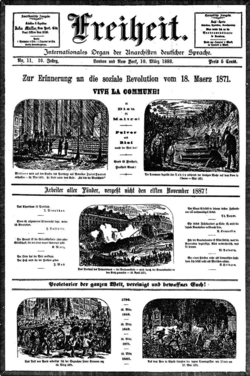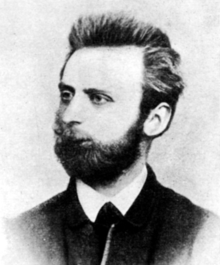Freedom (magazine)
| freedom | |
|---|---|

|
|
| description | International organ of anarchists in the German language |
| Area of Expertise | Anarchism , socialism |
| language | German |
| First edition | January 4, 1879 |
| attitude | August 13, 1910 |
| Sold edition | changing, an average of approx. 5,000 copies |
| editor | Johann Most |
Die Freiheit was an internationally distributed German-language magazine , initially radical social democratic , then social revolutionary and anarchist magazine, which was published from the end of the 19th to the first decade of the 20th century. It was mainly edited by Johann Most . From the first edition in January 1879 to the last in August 1910 it was printed with various subtitles and camouflages in Vienna , Switzerland , London and New York City , among others . In the first few years, freedom was temporarily circulated illegally in Germany due to the repressive socialist law.
history
The first issue of the magazine appeared on January 4, 1879. Already after the first issues of the Freedom it was published in the German Empire on January 17, 1879 due to the Socialist Law in force there for almost 2 1/2 months (October 22, 1878) (original title: " Law against the common dangerous endeavors of the social democracy ") prohibited. The ban only related to the title. The continued existence of the magazine was ensured by frequent changes to the title name. Cover titles were among others: The Revolutionary , Free Press , Warning Call , The Soldier's Friend , The Anchor , The Rebel , Justice . The subtitles also changed: Social-Democratic Organ , Organ of the Social Revolutionary German Language , International Organ of the Anarchists in the German Language , since 1908 Organ of the German Anarchists in America .
Initially, freedom was still valid before the journal Der Sozialdemokrat, which was also founded in Switzerland ten months later in 1879, as the organ of German social democracy in exile . After Freedom lost its status as an organ of social democracy when Mosts was excluded from the Socialist Workers' Party in Germany (SAP) in 1880 and the content had changed into an openly anarchist publication, it was increasingly replaced in its function as the journalistic mouthpiece of party political social democracy the newspaper Der Sozialdemokrat , which developed into the main organ of German social democracy during the Socialist Law on a supranational level and was also distributed illegally in the German Reich . Freedom continued to appear, however, and was henceforth considered to be a social-revolutionary-anarchist publication that also polemicized against the restrained, moderate attitude of the leading social-democratic parliamentarians in Germany . Most himself had been in exile in Britain since the Socialist Act came into force, where he was also monitored by the authorities. One of the most zealous employees in the first few years was August Reinsdorf .
An article in Freedom of March 19, 1881 under the heading " Finally " resulted in the arrest of Johann Most in London. The reason for the arrest lay in the content of the article, which assessed the assassination attempt by Russian Social Revolutionaries on Tsar Alexander II (on March 13, 1881) , which was ultimately fatal after several previous attempts, as positive. Most was sentenced to 16 months in prison as the editor. The set material for the magazine was confiscated. Further confiscations followed. The article " The Rebels Answer " published on May 13, 1882 about the Phoenix Park murders , an assassination attempt by radical Irish Republicans on Lord Frederick Cavendish and Undersecretary Burke in Dublin again led to the seizure of typesetting material and the arrest of the magazine's typesetters . Because of these reprisals, nobody in England dared to print the magazine anymore. As a consequence, Freedom - an overview of its history - was published in various places: from January 1879 to June 1882 in London; after Johann Most's release from prison and his subsequent emigration to the USA, it appeared (with no. 41) from December 1882 in New York; In New Jersey in 1886 ; possibly also in Zurich, Brussels and Paris. Due to the seizures and arrests, the changing locations cannot be precisely reconstructed. For the sake of camouflage and for your own safety, no more printing companies were mentioned, only the note Our new printer . For issues No. 34 to No. 39, Exeter was given in England, but for security reasons it was published in Switzerland. The number of copies differed depending on the destination country. With 400 subscribers in 1880/1881, the number of specimens smuggled to Germany was between 1,100 and 1,800. In the autumn of 1884 1,200 copies went to Europe every week; In 1885 5,000 were printed, 4,500 of which were destined for Germany. Freedom appeared as a weekly supplement in the Buffaloer Arbeiterzeitung from September 1897 to July 1899.
In Germany interested readers came together in secret reading clubs . The newspaper was considered an important organ of the German-speaking exile anarchists. Especially in the Rhine-Main area, Hamburg, Berlin, southern Germany, Bremen, and also in Aachen, Augsburg, Dresden, Dusseldorf, Cologne, Stuttgart and the like. a. In cities, the magazine found a larger audience in the reading circles. In the 1880s, freedom was also widespread among German-speaking workers in Bohemia, Austria and Hungary.
During Johann Most's prison stays, the magazine was also published by other people, including Johann Neve , Justus Schwab (New York) and the Communist Workers' Education Association in London. After Most's death in 1906, the magazine was published by his wife Helene Most and later by the Freedom Publishing Association until 1910. As a result of the different publication countries and locations, the editorial offices also changed. In addition to Johann Most, the editors were Karl Schneidt (Switzerland), Hermann Stellmacher, Karl Schrödter (also: Karl Schrödter-Brennwald. Is called a German police spy) and others. a. According to reports from the political police in Berlin, freedom was smuggled into Germany via Belgium, France, Switzerland and the Netherlands. This was done in tins, through intermediaries in luggage, in letters and as an attachment to other magazines. The publication also reached readers in the German Reich by ship and by post. London pamphlets were smuggled in plaster figures, in bamboo canes or sardine cans. The leaflets were printed in an edition of between 10,000 and 30,000 copies and contained special articles from freedom .
After 1886 the magazine Die Autonomie appeared in London and after the end of the Socialist Law several anarchist magazines appeared in Germany, which restricted the influence of freedom ; however, the publication retained an important function as a link as an international journal for German-speaking anarchists abroad until 1919.
Anarchist magazines of the same name
- Freedom , organ of the German Federation of Revolutionary Workers. Ed .: Wilhelm Klink. Berlin, Stuttgart, Amsterdam (1900–1903)
- Freedom , Political Weekly. Anarchosyndicalist (1928–1933)
English language magazines
- Freedom , London (1886 to date)
- Freedom , A Journal of Anarchist News and Opinion, New York (1933–?)
literature
- Heiner Becker, Max Nettlau (Ed.) History of Anarchy . Page numbers refer to the background of the magazine Freiheit and Johann Most as editor:
- Volume 1 : Max Nettlau, Library Thélème, Münster 1993. Reprint, with a new introduction by Heiner Becker (ed.); The early spring of anarchy . Pages 117, 118, 207, 234.
- Volume 2 : Max Nettlau, Library Thélème, Münster 1993, 1st edition, reprint of the Berlin edition, Verlag Der Syndikalist 1925, Der Anarchismus von Proudhon zu Kropotkin . Page 307
- Volume 3 : Max Nettlau, Library Thélème, Münster 1993, 1st edition, reprint of the Berlin edition, Verlag Der Syndikalist, 1927. Pages: 22, 94, 173, 222, 250, 340, 385, 399, 402, 404.
- Volume 4 : Max Nettlau, Anarchists and Social Revolutionaries . Library Thélème, Münster 1996. Reprint of the Berlin edition 1931. Pages: 6, 9, 164, 202, 274, 290, 299, 307, 399, 438, 445. ISBN 3-930819-00-7 and ISBN 3-930819 -01-5
- Volume 5 : Max Nettlau, The first heyday of anarchy . Page: 127, 203, 212, 229, 280, 300, 301, 385, 392, 472, 497.
- Heiner Becker (Ed.), Marxereien, Eseleien and Der gentle Heinrich . Articles from freedom; John Most. Selected and with an introduction by the publisher Büchse der Pandora, Wetzlar 1985. ISBN 3-88178-105-6
- Hans Manfred Bock , Syndicalism and Left Communism from 1918–1923 . Pages 40–43. Wissenschaftliche Buchgesellschaft (Abtl. Verlag), Darmstadt 1993. Updated edition from 1969. ISBN 3-534-12005-1
- Tom Goyens: Beer and revolution. The German anarchist movement in New York City, 1880–1914 . University of Illinois Press, Champaign 2007, ISBN 978-0-252-03175-5 (English).
- Frank Harreck-Haase: The Agitator - The Life of Johann Most, Volume 1 - The Socialist , Chemnitz 2017, ISBN 978-3-00-056998-2 .
- Frank Harreck-Haase: The Agitator - The Life of Johann Most, Volume 2 - The Anarchist , Chemnitz 2019, ISBN 978-3-00-060890-2 .
Individual evidence
- ↑ Announcement in the Central-Blatt for the German Empire 1879, p. 60
- ^ Johann Most: August Reinsdorf and the propaganda of the fact . Self-published, New York 1885. Digitized edition New York 1890
- ↑ In the Dirk Hoerders Papers of the International Institute for Social History (Amsterdam) are listed in the archive for the period from 1848–1929: Freedom, published in London and later in New York (5 volumes; volumes 1–3 are missing). 1881-1891. 3 microfilms. 40 14392, 14395, 14675. 41 14676-14677. 42 14678-14679. 43–50 No. 610 a spec. (14680–14688) The Spread of Freedom, which appeared in London and later in New York (9 volumes). 1879-1901. No. 1. (15593–15595) The Anarchist Movement in America (3 volumes). 1910-1918. No. 1 a adh. (15596–15600) The Anarchist Movement in America. Contains agent reports in English. (5 volumes). 1910-1917. No. 15. (15634-15635) Pinkerton Agents in America (2 volumes). 1901-1917. No. 1. (15791)
- ↑ Information about the historical background ( Memento of the original from October 13, 2008 in the Internet Archive ) Info: The archive link was inserted automatically and has not yet been checked. Please check the original and archive link according to the instructions and then remove this notice. of the magazine Alarm (London) in the database of German-speaking anarchism (as of July 14, 2001). Retrieved May 8, 2009
